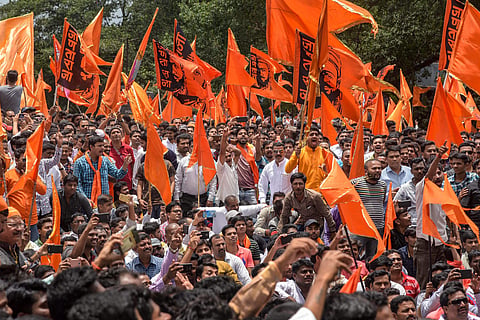

MUMBAI: The Bombay High Court on Thursday upheld the constitutional validity of reservation for the Maratha community in government jobs and education.
A division bench of Justices Ranjit More and Bharati Dangre, however, said the quota percentage should be reduced from 16 per cent to 12 to 13 per cent, as recommended by the State Backward Classes Commission.
"We hold and declare that the state government possesses legislative competence to create a separate category of the Socially and Educationally Backward Class (SEBC) and grant reservation," the court said.
"We, however, have held that the 16 per cent should be reduced to 12 to 13 per cent as recommended by the commission," the bench said. The court was hearing a bunch of petitions challenging the Maharashtra government's decision granting 16 per cent reservation to the Maratha community in government jobs and educational institutions. The government, while defending its decision, had said that it was meant to alleviate the Maratha community, which it said was socially and economically backward.
While reacting to the judgment, advocate Vijayalakshmi Khopde who is one of the petitioners opposing the Maratha reservation said they will appeal in the apex court as early as possible. "We will examine the judgment and will definitely appeal in the Supreme Court as early as possible. Marathas are a privileged caste in Maharashtra and need no reservation. The government too gave in to the popular demand instead of going into the nitty-gritty of the issue."
The petitioners also mentioned the Gaikwad commission report which states that Maratha is not a caste and raised the question of how can Marathas be given reservation in the first place.
The decision will now be referred to in states like Gujarat, Rajasthan, and Haryana where Patels, Gujjars and Jatts are demanding reservation in state government jobs and education. "This will obviously set a trend in other states where privileged castes are also demanding reservation. We need to understand that reservations are not for getting jobs but for the upliftment of backward castes who have faced oppression for centuries," Vijaylakshmi said.
On November 30, 2018, the Maharashtra legislature passed a bill granting 16 per cent reservation in education and government jobs for the Marathas, declared a socially and educationally backward class by the state government.
The reservation will be in addition to the existing 52 per cent overall reservation in the state. With the 16 per cent reservation for Marathas, the reservation quantum in the state was expected to rise to 68 per cent.
Several petitions were filed in the court challenging the reservation, while a few others were filed in its support.
The petitions challenging the quota decision had argued that it was violative of Supreme Court's orders which say that reservation in any state should not exceed 50 per cent. To which the court said, "Exceptional circumstances exist for Marathas in the state and hence the reservation can exceed that."